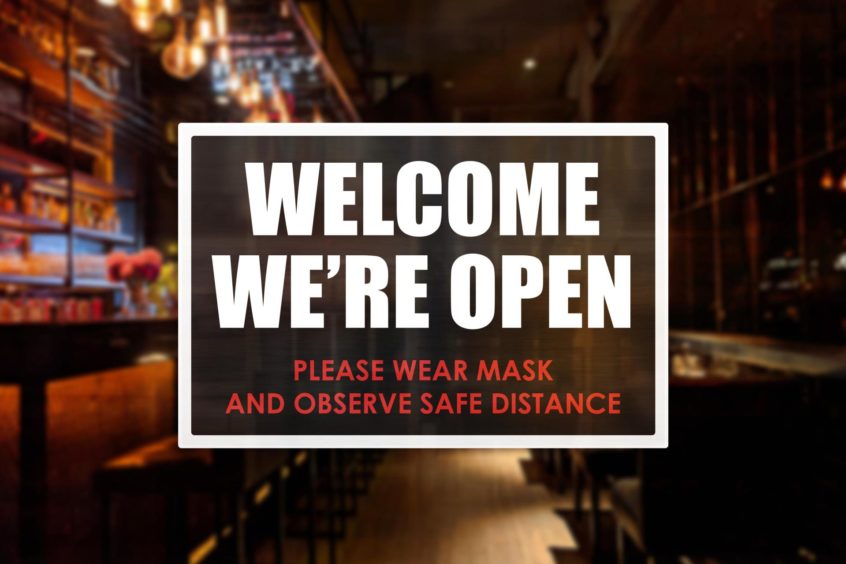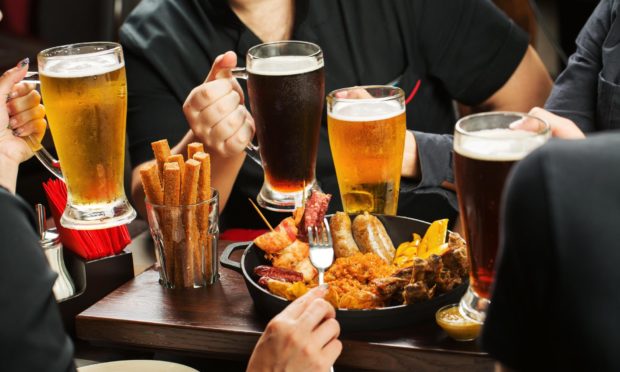With Scottish Government restrictions placing Aberdeen in Tier 2 which means alcohol can only be served outdoors unless it accompanies a main meal, many customers may have been left pondering exactly what defines a main meal?
In Tier 2, bars which have a food offering and hotels, which generally tend to have a full lunch and dinner service available, can now serve alcoholic beverages indoors as long as it is accompanying a main meal.
Does that mean you need to have a full Sunday roast, does a bowl of soup qualify or can you get away with a bag of crisps or nuts?
These are just some of the questions posed since Tier 2 restrictions came into force on November 2.
The Scottish Government has provided information for publicans and hoteliers as part of its strategic framework spelling out exactly what you can and cannot do as a licensed premises if you are now in Tier 2.
In the answers detailed below the government points out that businesses have a responsibility to use their common sense with regards to the serving of drinks. They say a bag of crisps or nuts is definitely not acceptable, while what is served as a main meal must be substantial like soup and a sandwich, with either on its own not tolerable.
What constitutes a main meal?
A main meal would typically be something more than a mere snack – such as a plated meal, usually (though not necessarily) eaten with cutlery, and could include a substantial filled sandwich or panini served with a side such as salad or chips, or a “soup and a sandwich” style meal, as well as other more substantial meals which may have more than one course. A common-sense approach should be taken.
Can I serve light snacks as a meal?
Crisps, nuts and similar “bar snacks” would not constitute a meal.
What facilities do I need to meet the requirement to provide a “main meal”?
In order to provide bar meals you would need to have this activity (or restaurant facilities) within the operating plan of your premises licence. Your business premises would also have to be currently registered as a food business under the Food Hygiene Act 1990, and have appropriate certificates in place to cover kitchen or food preparation facilities. You would also have to have staff with the appropriate skills and training to provide this service.
Can external catering be used to supply meals?
Unless as part of arrangements providing a reception for a life event where catering services may be provided, then the food must be prepared on the premises i.e. bringing a meal in from a takeaway to facilitate the opening of a premises to serve alcohol does not qualify.
How do I ensure I am meeting the requirement to only serve alcohol with a main meal?
Businesses should ensure that they communicate the requirement to serve alcohol (as ancillary to/with a meal to customers as best they can. When customers arrive, it would be helpful to have staff manage expectations of customers as to the duration of potential alcohol consumption after the meal has concluded, and to underline that under the current Level Two requirements the consumption of alcohol is secondary to the consumption of the meal. It is expected that businesses will sensibly monitor the ordering and consumption of alcohol by their customers to ensure the requirement is met.

Can I serve as many drinks as a customer wishes during and after a main meal?
It is anticipated that operators would serve alcohol responsibly in line with the licensing objectives. Scots licensing law confirms that the traditional drink served at the beginning, whilst waiting on the meal itself, is treated as part of the meal, along with drinks served whilst the meal is consumed, and within reason, some consumption – eg finishing a bottle of wine, or the taking of a postprandial digestif (a liquer for instance) – after the immediate consumption of the meal has concluded.
After the customer has consumed their meal can they stay on the premises and continue to order drinks?
Apart from reasonable finishing off (i.e. the remains of a bottle of wine or the taking of a postprandial digestif) there should be no further service of alcohol.
Does the customer have to consume the main meal?
There may be genuine reasons why someone may not be able to finish the majority of a main meal that they have ordered, but there should be no attempt to frustrate the intention of the rules with the aim of making the consumption of alcohol the primary activity. It should be obvious to premises if services are not being used appropriately for meal service.
Do all individuals have to purchase a main meal to be permitted to buy alcohol or can one person per table?
The service of alcohol is secondary to the service of a main meal. The service of alcohol should not be offered to anyone who has not ordered food.
What about platter dishes or afternoon teas that are designed to be shared by more than one person – can alcohol be serve with these products?
Yes, it should be clear that what is being ordered constitutes a main meal even if being ordered by one person. The same approach applies, alcohol is secondary to the meal.
